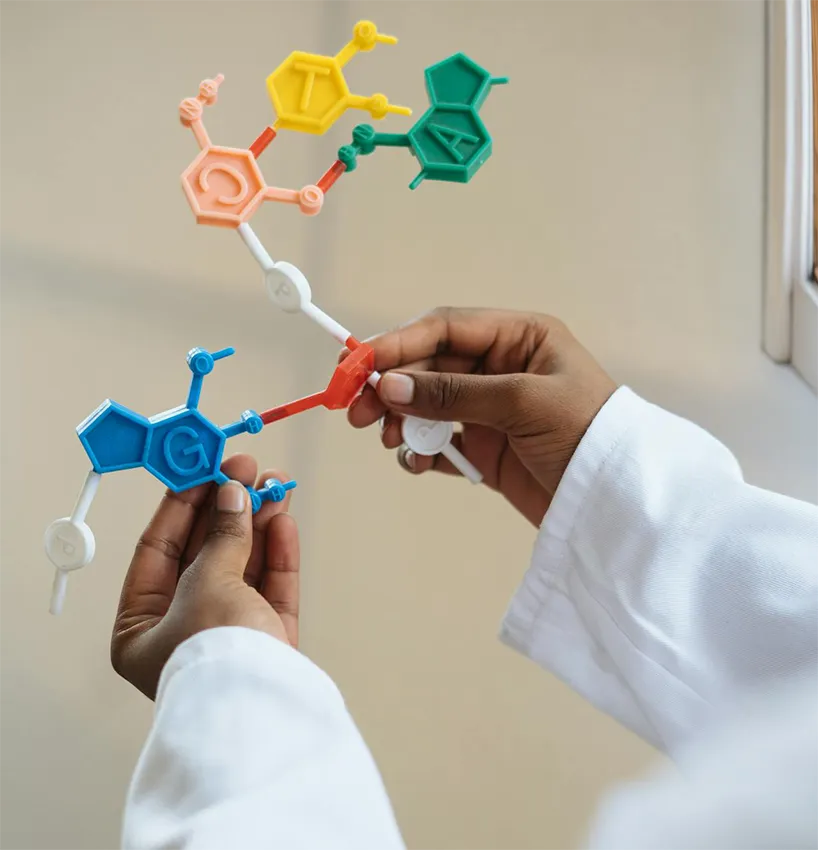
Finding out you’re pregnant can be a bit scary.
Especially if your pregnancy is unexpected.
Understanding pregnancy hormones and testing can help ease some worries.
It’s normal to feel uncertain, but knowing more about your body and the process can bring some peace of mind.
Let’s look at human chorionic gonadotropin (hCG) and how it helps detect pregnancy.
Key Points: hCG and Pregnancy Tests
- hCG is the hormone detected by pregnancy tests
- hCG levels rise rapidly in early pregnancy
- Home pregnancy tests detect hCG in urine
- Blood tests can detect hCG earlier than urine tests
- hCG levels typically double every 2-3 days in early pregnancy
- Very high hCG levels may indicate multiple pregnancies
- Low or slow-rising hCG may signal pregnancy complications
- Testing too early can lead to false negative results
The Role of hCG in Pregnancy
hCG is called the “pregnancy hormone” because it’s made during pregnancy by cells that form the placenta. It shows up in your blood and pee as early as 10 days after conception. hCG helps support the growing baby by keeping the corpus luteum, which makes progesterone in early pregnancy.

hCG levels go up fast in early pregnancy, usually doubling every 2-3 days. This is why pregnancy tests become more accurate as time passes after conception.
Understanding early pregnancy signs can help you know when to take a test. Some common early signs are missed periods, sore breasts, feeling tired, and feeling sick.
Types of Pregnancy Tests
There are two main types of pregnancy tests: urine tests and blood tests. Both look for hCG, but they work a bit differently and can detect different amounts.
Urine Tests
Home pregnancy tests use pee to find hCG. These tests are about 99% accurate when used right. For the best results, it’s good to take the test at least 1-2 weeks after your missed period. Most home tests can find hCG levels as low as 25-50 mIU/mL, but some can find even lower levels.
Blood Tests
Blood tests can find pregnancy earlier than urine tests, sometimes as early as 7-10 days after conception. There are two types of blood tests:
- Qualitative hCG test: This test just checks if hCG is in the blood. It gives a yes or no answer to whether you’re pregnant.
- Quantitative hCG test: This test measures the exact amount of hCG in the blood. It can be useful for tracking how a pregnancy is going or checking certain pregnancy-related conditions.
Learn more about different pregnancy test options to find what’s best for you. Each type of test has its good points, and your doctor can help you decide which is best for you.
How Pregnancy Tests Work

Pregnancy tests work by finding hCG in your pee or blood. When you use a home test, you’re asking the test to check if there’s enough hCG in your pee to show pregnancy. The test strip has special parts that stick to hCG molecules.
If the test finds enough hCG, it will show a positive result. This is usually a line, plus sign, or the word “Pregnant” on the test stick. How dark the line or symbol is doesn’t always mean how strong the pregnancy is or how much hCG there is.
It’s important to follow the instructions carefully and talk about taking a pregnancy test with your partner if you’re in a relationship. Talking openly can help reduce stress and make sure you both feel supported.
Factors Affecting Pregnancy Test Accuracy
Several things can affect how accurate pregnancy tests are:
- Timing: Testing too early can give false negatives. The best time to test is after your missed period.
- Diluted pee: Using very watery pee (like after drinking a lot of fluids) can affect results. It’s often best to use first-morning pee for the most concentrated sample.
- Medications: Medicines with hCG can cause false positives.
- Test expiration: Using an old test can give wrong results. Always check the expiration date before using.
- User error: Not following the instructions exactly can lead to wrong results. This includes not waiting long enough to read the result or misunderstanding the test lines.
Understanding the emotional impact of pregnancy, especially for teens, is important when looking at test results. It’s normal to feel many emotions, and getting support is important.
Hope House Women’s Clinic Pregnancy Testing Services

At Hope House Women’s Clinic, we offer free pregnancy testing in a private and supportive place. Our caring staff can help you understand your test results and give you information about your options. We use reliable pregnancy tests to make sure the results are accurate.
We also offer extra resources and counseling to support you during this time. Our services include:
- Private pregnancy testing
- Options counseling
- Referrals for prenatal care
- Emotional support and guidance
Learn about our ultrasound services for confirming pregnancy after a positive test. Ultrasounds can give valuable information about the health and age of the pregnancy.
Next Steps After a Positive Pregnancy Test
If your pregnancy test is positive, the next steps usually include:
- Confirming the pregnancy with a doctor: This might involve a blood test or ultrasound.
- Starting prenatal vitamins: Folic acid is especially important in early pregnancy.
- Exploring prenatal care options: Choose a doctor for your pregnancy journey.
- Considering lifestyle changes for a healthy pregnancy: This might include changing your diet, avoiding alcohol and tobacco, and getting regular exercise.
- Emotional preparation: Process your feelings and talk about the pregnancy with your partner or trusted support system.
Remember, ultrasounds can provide valuable information about your pregnancy and help figure out how far along you are. They can also confirm if the pregnancy is healthy and rule out ectopic pregnancies.
Conclusion: Support for Expectant Mothers
Understanding pregnancy hormones and testing can help you feel more confident in the early stages of pregnancy. Remember, finding out early is important for getting the care and support you need. Whether your test is positive or negative, it’s important to follow up with a doctor for confirmation and guidance.
At Hope House Women’s Clinic, we’re here to support women through every step of their pregnancy journey. Whether you need a test, confirmation, or just someone to talk to, we’re here for you. Our caring staff understands the complex feelings that can come with pregnancy, and we’re here to provide support and resources without judgment.
For new mothers feeling worried or overwhelmed, remember this comforting verse:
“For I know the plans I have for you,” declares the Lord, “plans to prosper you and not to harm you, plans to give you hope and a future.” — Jeremiah 29:11
Remember, you’re not alone in this journey. Hope House Women’s Clinic in Moultrie Georgia is here to support you every step of the way, providing caring help, accurate information, and a listening ear whenever you need it.